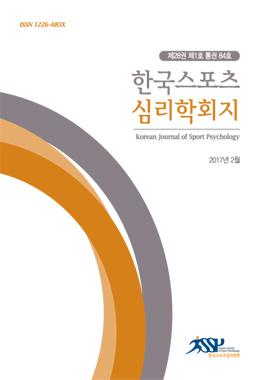목적: 이 연구의 목적은 영유아 어머니의 운동행동 실천에 따른 양육스트레스의 차이를 분석하고, 이들의 운동제약 요인을 탐색하는 것이다. 방법: 연구대상자는 0세부터 6세까지의 자녀를 둔 어머니 275명이며, 측정도구는 운동행동변화단계, 한국판 양육스트레스 축약형 척도(K-PSI-SF), 운동제약 요인에 대한 개방형 질문이다. 수집된 자료는 확인적 요인분석, 독립 t-검증, 귀납적 내용분석에 의해 처리되었다. 결과: 첫째, 영유아 어머니의 운동실천에 따른 양육스트레스는 부모의 고통 요인과 총 양육스트레스 요인에서 통계적으로 유의한 차이가 나타났다 (p< 0.05). 그러나 부모-자녀 간 역기능적 상호작용 요인과 아동의 까다로운 기질 요인은 통계적으로 유의한 차이가 나타나지 않았다(p >0.05). 둘째, 영유아 어머니의 운동제약 요인에 대한 귀납적 내용 분석의 결과는 환경적, 대인적, 개인적 영역의 세 영역으로 범주화 되었다. 환경적 영역은 시간적, 경제적, 프로그램 및 정보 제약의 범주를 포함하며, 대인적 영역은 아이돌봄과 주요타자 제약이, 개인적 영역에는 신체적, 심리적 제약을 포함한다. 결론: 이 연구를 통해 영유아 어머니들의 운동행동 실천에 따라 양육스트레스에 부분적으로 차이가 나타나는 것을 확인하였으며, 이들의 운동제약 요인을 탐색하였다. 미래 연구에서는 영유아 어머니들의 규칙적인 운동실천을 위한 운동 상담 프로그램의 개발 관련 연구가 수행될 것을 제언하는 바이다.
Purpose: The purpose of the study was to compare parents` stress levels according to their exercise practices, and, particularly, to explore exercise constraints for mothers of young children. Methods: Participants included 275 mothers with children aged 0 to 6 years. They completed a questionnaire to assess the stage of exercise behavior, a Korean parenting stress index-short form (K-PSI-SF), and an open-ended question regarding exercise constraint factors. Data were analyzed using confirmatory factor analysis, an independent t-test, and inductive content analysis. Result: First, there were significant differences in the stress levels of parents between the exercise and non-exercise groups in parental distress and total parenting stress (p< 0.05). However, there were no significant differences between the exercise and non-exercise groups in parent-child dysfunctional interactions and difficult child factors (p >0.05). Second, exercise constraint factors from inductive reasoning produced three categories: environmental, interpersonal, and personal matters. Matters of environment involve time, economy, and program/information constraints. Interpersonal matters include child-care and significant other constraints. Personal matters pertain to physical and psychological issues. Conclusion: The research findings confirmed that exercise behavior partially affects the stress levels of mothers with young children and exploring exercise constraint factors of mothers with young children. This suggests that future studies should focus on building exercise counseling programs to promote regular exercise among mothers with young children.


